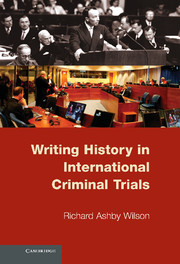Book contents
- Frontmatter
- Contents
- Epigraph
- Preface and Acknowledgments
- Figures and Tables
- Glossary
- 1 Assessing Court Histories of Mass Crimes
- 2 What Does International Actually Mean for International Criminal Trials?
- 3 Contrasting Evidence: International and Common Law Approaches to Expert Testimony
- 4 Does History Have Any Legal Relevance in International Criminal Trials?
- 5 From Monumental History to Microhistories
- 6 Exoneration and Mitigation in Defense Histories
- 7 Misjudging Rwandan Society and History at the International Criminal Tribunal for Rwanda
- 8 Permanent Justice: The International Criminal Court
- 9 Conclusion: New Directions in International Criminal Trials
- Appendix: Methodology and the Survey Instrument
- Bibliography
- Index
9 - Conclusion: New Directions in International Criminal Trials
Published online by Cambridge University Press: 05 June 2012
- Frontmatter
- Contents
- Epigraph
- Preface and Acknowledgments
- Figures and Tables
- Glossary
- 1 Assessing Court Histories of Mass Crimes
- 2 What Does International Actually Mean for International Criminal Trials?
- 3 Contrasting Evidence: International and Common Law Approaches to Expert Testimony
- 4 Does History Have Any Legal Relevance in International Criminal Trials?
- 5 From Monumental History to Microhistories
- 6 Exoneration and Mitigation in Defense Histories
- 7 Misjudging Rwandan Society and History at the International Criminal Tribunal for Rwanda
- 8 Permanent Justice: The International Criminal Court
- 9 Conclusion: New Directions in International Criminal Trials
- Appendix: Methodology and the Survey Instrument
- Bibliography
- Index
Summary
THROUGH THE PAST, DARKLY
Criminal law's methods for determining the facts have been transformed by the rise of modern science since the seventeenth century, when the French court trying Jean Calas for murder held that joining many light pieces of evidence together created a grave one, and two grave ones added up to a violent one, at which point questioning the accused under torture was deemed warranted. Yet modern law still constitutes a distinctive system of knowledge that is guided by its own principles for comprehending human behavior. The evidence allowed in a trial regarding the actions and intentions of accused persons is circumscribed with guidelines that steer jurists away from both specialist and nonspecialist (read “commonsense”) forms of knowing into a domain that is uniquely legal. Upon reviewing numerous trials at three international justice institutions, it is apparent that the critiques of domestic law presented at the beginning of this book can also apply to international criminal tribunals. Legal ways of knowing at international tribunals are at times utterly distinctive, as seen in their predilection (especially in leadership cases) for documents over other forms of evidence and witnessing. Not only are documents preferred as sources, but also there exists a hierarchy of documents in which primary documents are accorded greater probative value than secondary documents, and official documents are given more weight than unofficial ones.
- Type
- Chapter
- Information
- Writing History in International Criminal Trials , pp. 216 - 226Publisher: Cambridge University PressPrint publication year: 2011



